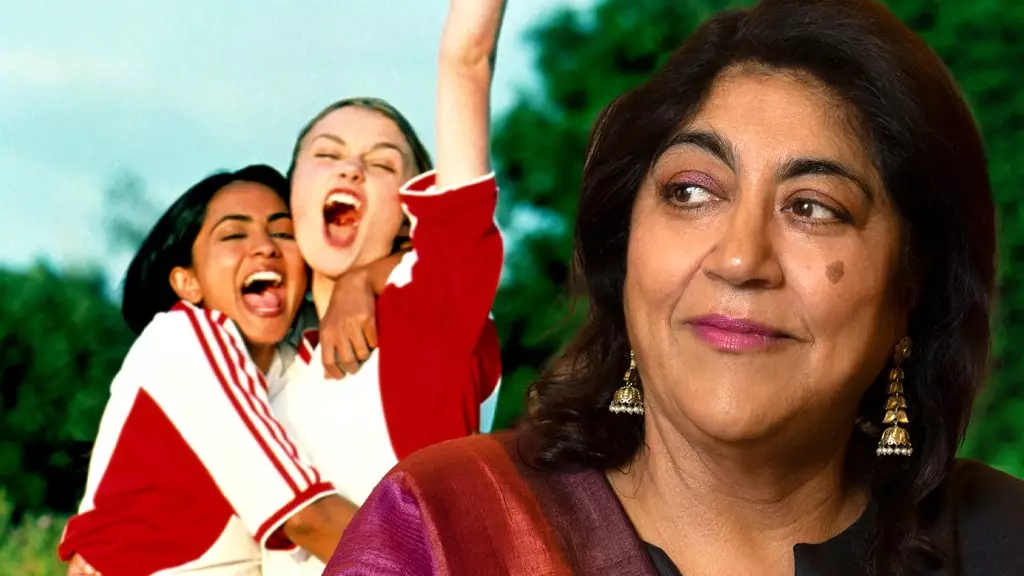The announcement of a sequel to Gurinder Chadha’s iconic 2002 film, Bend It Like Beckham, marks a pivotal moment in both cinematic history and the ongoing evolution of women’s sports. The original film was more than just a comedy-drama; it became a cultural phenomenon that challenged societal stereotypes and celebrated female ambition and diversity. Now, after over two decades, the film’s resurrection promises to build on its legacy, inspiring new generations and emphasizing the importance of representation in sports and entertainment.
The original movie served as a groundbreaking narrative that defied conventions, showcasing young women from diverse backgrounds defying societal expectations to pursue their passions. This new chapter is not merely a nostalgic revisit but a deliberate effort to amplify the message that sports, especially women’s football, are no longer peripheral but central to global culture. Chadha’s intent to revisit her beloved characters signals a commitment to prolong the conversation about gender equality, cultural identity, and resilience, reinforcing how stories can shape societal perceptions.
From Passion to Purpose: The Creative Journey Toward the Sequel
Chadha’s enthusiasm for crafting a compelling story that respects the original’s spirit is palpable, yet she remains grounded in the reality that success hinges on more than just a good idea. She understands fully that the cast’s willingness to return depends on the script’s quality, a testament to her dedication to authentic storytelling. Her focus on providing each character with meaningful arcs demonstrates her commitment to making this sequel more than a mere cash-in; it must be a genuine extension of her original vision.
Furthermore, the resurgence of interest in women’s football, propelled by the sport’s growing popularity worldwide, has reinvigorated Chadha’s creative energy. The increased visibility and media coverage have transformed women’s football from a niche sport into a global spectacle. This cultural shift offers fertile ground for a film that can resonate on multiple levels—balancing entertainment with social commentary. For Chadha, this isn’t just about nostalgia; it’s about harnessing a powerful movement and embedding it into storytelling.
She has been working on this project for nearly two years, carefully nurturing the concept and seeking the right narrative depth. Her collaboration with Paul Mayeda Berges, a trusted writing partner, ensures that the sequel will maintain the humor, heart, and social relevance that made the original so impactful. The fact that they are now discussing the screenplay indicates a serious commitment and an understanding that a powerful story must be at its core.
Championing Women’s Sports Through Cinema
The influence of Bend It Like Beckham extends far beyond entertainment; it has become a touchstone for inspiring women in sports. Notably, Emma Hayes, the acclaimed coach of the U.S. Women’s National Soccer Team, has openly credited the film with inspiring her journey—highlighting its impact on the sport’s perception and the burgeoning confidence of women athletes globally.
Hayes’ involvement, along with support from figures like Lisa Nandy MP, signals a broader recognition that sports stories are intrinsically tied to cultural progress. Nandy’s remarks about the film’s role in capturing Britain’s spirit and diversity underscore its power as a social catalyst. This respect for Chadha’s work goes beyond entertainment—it acknowledges its potential to instigate societal change by elevating the stories of women, particularly those from marginalized communities.
The original film shattered stereotypes when it first premiered, and the upcoming sequel aims to continue this legacy by illustrating how far women’s football has come. Chadha’s vision reflects an understanding that storytelling can be a force for social justice, fostering pride and inspiration among young girls who see themselves reflected on screen.
The Timing and Cultural Significance
The strategic timing of this sequel aligns with a heightened global focus on women’s sports. Chadha envisions a release around 2027, coinciding with the 25th anniversary of the original’s UK debut and the FIFA Women’s World Cup in Brazil. This period represents an opportune moment to not only celebrate the sport’s evolution but to also push further its cultural acceptance and visibility.
The decade-long gap since the original’s release allows for a refreshed narrative that incorporates contemporary issues—such as gender equality, mental health, and cultural pride—while still honoring the core themes of ambition and perseverance. This isn’t just about revisiting old characters; it’s about crafting a story that encapsulates the current moment in women’s sports, which is characterized by rapid growth, increasing professionalism, and global fan engagement.
Chadha has articulated her desire to address these themes with honesty and joy, suggesting a film that will be both emotionally compelling and entertaining. Her insight into the evolution of women’s football underscores her belief that cinema can be a mirror of societal progress—a platform to celebrate achievements and inspire further change.
Artists, Activism, and the Future of Female Empowerment Stories
The collaboration with Emma Hayes exemplifies how the sequel could become a bridge between entertainment and activism. Hayes, once a character in Chadha’s creative universe, is now a real-life leader in empowering women athletes. Her participation signifies a commitment to authenticity and to highlighting the intricacies of female sports development.
The support from political figures like Nandy hints at a broader societal endorsement, acknowledging that stories like Bend It Like Beckham are integral to national identity and cultural narratives. Chadha’s film has transcended its initial entertainment value; it’s a symbol of possibility, resilience, and dreaming big—values that continue to echo in the current landscape of women’s sports.
In the end, this planned sequel is more than just a return to beloved characters; it’s a strategic and heartfelt effort to extend the film’s legacy into a new era. It underscores the transformative power of storytelling, demonstrating that with the right narrative, cinema can positively influence perceptions, inspire generations, and champion social progress. Chadha’s renewed focus and the proactive steps she’s taking suggest that this project might not only rekindle old memories but also ignite new passions—both on screen and through real-world change.
